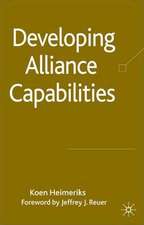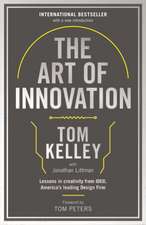Destructive Goal Pursuit: The Mt. Everest Disaster
Autor D. Kayesen Limba Engleză Hardback – 29 iun 2006
| Toate formatele și edițiile | Preț | Express |
|---|---|---|
| Paperback (1) | 378.21 lei 6-8 săpt. | |
| Palgrave Macmillan UK – 29 iun 2006 | 378.21 lei 6-8 săpt. | |
| Hardback (1) | 385.88 lei 6-8 săpt. | |
| Palgrave Macmillan UK – 29 iun 2006 | 385.88 lei 6-8 săpt. |
Preț: 385.88 lei
Nou
Puncte Express: 579
Preț estimativ în valută:
73.90€ • 76.14$ • 61.91£
73.90€ • 76.14$ • 61.91£
Carte tipărită la comandă
Livrare economică 24 februarie-10 martie
Preluare comenzi: 021 569.72.76
Specificații
ISBN-13: 9780230003323
ISBN-10: 023000332X
Pagini: 184
Ilustrații: XXIV, 184 p.
Dimensiuni: 140 x 216 x 18 mm
Greutate: 0.43 kg
Ediția:2006
Editura: Palgrave Macmillan UK
Colecția Palgrave Macmillan
Locul publicării:London, United Kingdom
ISBN-10: 023000332X
Pagini: 184
Ilustrații: XXIV, 184 p.
Dimensiuni: 140 x 216 x 18 mm
Greutate: 0.43 kg
Ediția:2006
Editura: Palgrave Macmillan UK
Colecția Palgrave Macmillan
Locul publicării:London, United Kingdom
Cuprins
Introduction PART I: EVEREST AND DESTRUCTIVE GOAL PURSUIT The 1996 Mt. Everest Climbing Disaster Destructive Goal Pursuit The Problem of Goalodicy The Limits of Leadership The Breakdown of Learning in Teams PART II: OVERCOMING DESTRUCTIVE GOAL PURSUIT Learning Teamwork Ethical Decision-Making PART III: REMEDIES: EVEREST AS A SOURCE OF LEARNING ABOUT LEADERSHIP From Destructive to Productive Pursuit Rethinking the Role of Leader
Recenzii
'This book takes the concept of learning from experience in a new, although not completely unfamiliar direction. The events serve as a rich example of how learning from experience is central to leadership success in dynamic environments. By identifying the negative and potentially disastrous consequences of the non-reflective pursuit of ambitious goals, this book offers a sage warning to those of us who live in a culture where high goals are a praiseworthy status symbols and relentless pursuit of them a sign of moral superiority. The book reflects a growing problem that can be seen in many different situations. Leaders who set high goals and pursue them regardless of the consequences are seen as principled, while the leader who learns from experience and modifies goals accordingly runs the risk of being seen as wishy-washy.' David Kolb, author, 'Experiential Learning: Experience as the source of Learning and Developmen't and Professor of Organizational Behavior, Case Western Reserve University.
Alice Kolb, President, Experience Based Learning Systems, Inc.
'Destructive Goal Pursuit not only has debunked as myopic and maladapative, the mystique that has surrounded goal setting, management by objectives, and other performance-driven incentive schemes, but has done so by balancing scholarly depth with general accessibility. Dr. Kayes has pulled off that rarest of authorial feats; a splendidly written book that-whether used in a leadership course or for personal development-will enchant and challenge, disturb and provoke, inspire and educate.' James R. Bailey, Professor of Management, George Washington University, Editor, 'Academy of Management Learning& Education'
'The Everest events teach many lessons about doing business in the global context. A must read for understanding the importance of building human capital. Leaders at every level of an organization will gain insight into topics as diverse as leading in a global context, building relationships with followers, and how leaders serve as the keepers of organization survival. Professor Kayes moves beyond the hype surrounding the events, to provide lessons on leadership, teamwork and ethical decision making.' David Stirling, Partner, Human Capital Group, IBM Consulting Services
'Leadership is more than just motivating and ordering, leadership is about developing others. Professor Kayes paves the way for a new and exciting way to see how leaders come into being. Whether you are leading in extreme situation like Everest, or more common settings, most leaders experience pressure to achieve continually higher and more challenging goals. This book provides both the warning signs and the ways to overcome destructive goal pursuit.' Lieutenant Colonel, Nate Allen, U. S. Army, co-founder of CompanyCommand.com
'In summary, Destructive Goal Pursuit is a book that offers valuable lessons for mountaineers, entrepreneurs, leaders, business peope and others whohave an interest in setting high goals and achieving them safely and productively.' - Jeni L. Burnette and Jeffrey M. Pollack, PsycCritiques
Alice Kolb, President, Experience Based Learning Systems, Inc.
'Destructive Goal Pursuit not only has debunked as myopic and maladapative, the mystique that has surrounded goal setting, management by objectives, and other performance-driven incentive schemes, but has done so by balancing scholarly depth with general accessibility. Dr. Kayes has pulled off that rarest of authorial feats; a splendidly written book that-whether used in a leadership course or for personal development-will enchant and challenge, disturb and provoke, inspire and educate.' James R. Bailey, Professor of Management, George Washington University, Editor, 'Academy of Management Learning& Education'
'The Everest events teach many lessons about doing business in the global context. A must read for understanding the importance of building human capital. Leaders at every level of an organization will gain insight into topics as diverse as leading in a global context, building relationships with followers, and how leaders serve as the keepers of organization survival. Professor Kayes moves beyond the hype surrounding the events, to provide lessons on leadership, teamwork and ethical decision making.' David Stirling, Partner, Human Capital Group, IBM Consulting Services
'Leadership is more than just motivating and ordering, leadership is about developing others. Professor Kayes paves the way for a new and exciting way to see how leaders come into being. Whether you are leading in extreme situation like Everest, or more common settings, most leaders experience pressure to achieve continually higher and more challenging goals. This book provides both the warning signs and the ways to overcome destructive goal pursuit.' Lieutenant Colonel, Nate Allen, U. S. Army, co-founder of CompanyCommand.com
'In summary, Destructive Goal Pursuit is a book that offers valuable lessons for mountaineers, entrepreneurs, leaders, business peope and others whohave an interest in setting high goals and achieving them safely and productively.' - Jeni L. Burnette and Jeffrey M. Pollack, PsycCritiques
Notă biografică
D. CHRISTOPHER KAYES is Professor of Organizational Behaviour at George Washington University, USA. His research includes 35 papers and numerous consulting engagements around the world. He has won several awards, including best paper in 2004 in the journal Human Relations for The 1996 Mt. Everest Climbing Disaster: The Breakdown of Learning in Teams. His paper Experiential Learning and Its Critics: Preserving the Role of Experience in Management Learning and Education was one of three best papers for 2002-2003 in the Academy of Management Learning and Education, nominated alongside Henry Mintzberg and Jeffery Pfeiffer.















